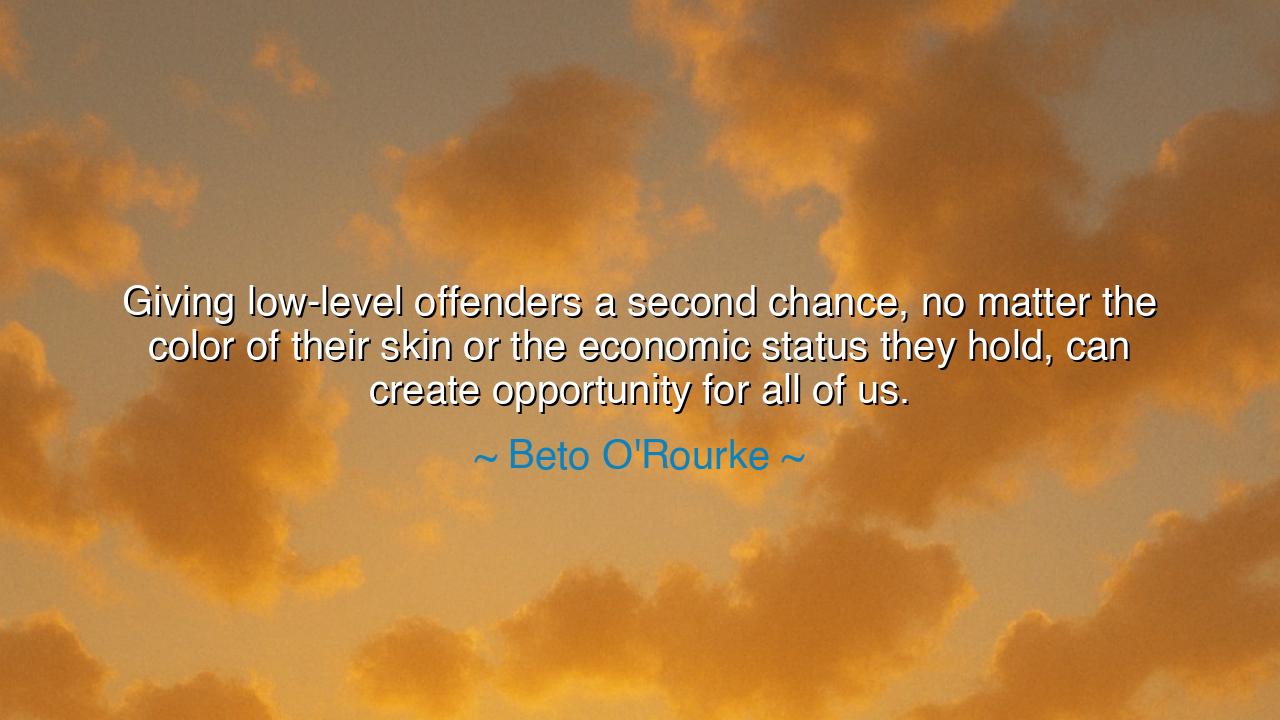
Giving low-level offenders a second chance, no matter the color
Giving low-level offenders a second chance, no matter the color of their skin or the economic status they hold, can create opportunity for all of us.






In the depths of human history, there have always been those who have faltered, those whose actions have strayed from the path of righteousness. And yet, within the hearts of the wise, there has always been a recognition that the true measure of a society is not found in how it punishes the fallen, but in how it raises them once more. Beto O'Rourke speaks to this ancient truth when he declares: "Giving low-level offenders a second chance, no matter the color of their skin or the economic status they hold, can create opportunity for all of us." In these words lies a call to justice, to mercy, and to the very essence of what it means to be human.
What O'Rourke speaks of is not merely a political idea, but a moral truth that has echoed through the ages: the power of redemption. For to give a second chance to those who have stumbled is to acknowledge that all men and women are more than the sum of their errors. Low-level offenders, whether they come from the wealthiest palaces or the humblest hovels, are still human, capable of change, capable of rising from their mistakes and contributing to the greater good. It is an idea that has always been with us, from the laws of ancient civilizations to the teachings of the great philosophers.
Consider the example of Cicero, the great Roman orator, who once argued that the strength of a nation is found not in the severity of its punishments, but in the opportunity it offers for the reformation of its citizens. The Roman Empire, for all its grandeur, understood the power of the second chance. Those who had committed lesser crimes, those whose hearts were not irredeemably stained, were often granted the chance to atone, to prove that they were more than their mistakes. It was through this mercy and forgiveness that Rome could maintain its strength, for a society that does not offer a path to redemption is a society that condemns itself to decay.
In our own time, we are called to recognize that race and economic status should not be the measures by which we determine a person's worth. O'Rourke reminds us that the mistakes of the poor and the oppressed should not be met with harsher judgment than those of the wealthy and privileged. This, too, is a lesson as old as civilization itself—justice must be blind, not in the sense of ignoring the differences among men, but in treating all with equal dignity. For in giving a second chance to all, we are not only lifting up the individual, but we are also lifting up society as a whole.
The story of Nelson Mandela comes to mind. When the leader of South Africa was imprisoned for his fight against apartheid, the world saw him as a symbol of resistance. Yet, it was not his years of suffering that defined him, but the mercy he showed upon his release. Mandela could have chosen vengeance, could have chosen to punish those who had wronged him and his people. Instead, he chose reconciliation. By extending a second chance to his enemies and working to heal the wounds of his nation, he helped create a society where opportunity could flourish, where the future was not shaped by past mistakes, but by a shared vision of unity and progress.
And so, the lesson is clear. O'Rourke reminds us that offering second chances is not an act of weakness, but of strength. It is an act that fosters hope, that creates a space for people to rise from their mistakes, to learn, and to contribute to the flourishing of society. When we deny a second chance, when we close the door to redemption, we are not only punishing the individual, but we are impoverishing the entire community. For every person who is denied the opportunity to change, we lose the potential that they carry within them—the potential to be better, to be more, to contribute to the greater good.
In our own lives, let us live by this principle. When we encounter those who have erred, let us look beyond the surface, beyond their mistakes, and see the human being before us, capable of growth and transformation. Whether in the realm of justice, in our personal relationships, or in the ways we engage with society, let us be quick to offer a second chance. For in doing so, we not only redeem the individual, but we open the door to a future where opportunity is available to all, regardless of their past, their race, or their economic standing. In this way, we will build a society that is truly just, one that grows and thrives on the principles of mercy and hope.






AAdministratorAdministrator
Welcome, honored guests. Please leave a comment, we will respond soon